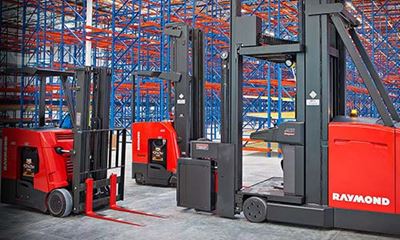Leasing advice for your changing operation
- share

In today’s dynamic material handling landscape, flexibility is important — especially when it comes to sourcing and leasing forklifts and intralogistics solutions for an operation. Learn the importance of working with a trusted provider that can ensure operations get the equipment and appropriate financing that is tailored to meet their unique needs.
Flexible financing isn’t a new concept, but it has gained some ground during a time when operations need to quickly accommodate an ever-changing economic landscape. Here are four things to look for in your next lease program:
1. A wide range of program options. Providing a wide range of program options — such as seasonal payments and step-up / step-down or single-payment leases — helps customers tailor cash flows to their income streams. Negotiating a lower monthly payment can reduce your payment and can be arranged in a variety of ways, including extending your lease term.
An operating lease can further reduce your monthly payment for the same piece of equipment and allow you to upgrade equipment at the end of the term. These adaptable programs can also benefit your bottom line at the end of a lease term. If the trucks in question still have a viable life at the conclusion of a lease, customers can choose to purchase those vehicles or extend the lease for 12 to 24 months, further lowering the payment.
2. Flexibility in changing out equipment. Customers often experience challenges as a result of not having an effective method for replacing their fleet over time. Just because you have a forklift in your fleet doesn’t mean it has to stay there. It’s important to look for a flexible leasing partner so you can arrange to swap out equipment to better suit your operation if your business needs change.
After five years, customers may see increased repair and maintenance costs that can be difficult to manage. By entering into a five-year lease, that operation could easily “flip the fleet” every 60 months to enjoy the benefits of a newer fleet while keeping costs fixed and manageable.
3. The ability to consolidate payments into one invoice. Operations can simplify their finances and accounting by leasing with a company that combines a variety of different invoices into one lease bucket. Companies often will receive a handful of invoices for numerous costs in addition to the forklift itself, including the battery, charger, attachment, maintenance, a fleet management system, and more. The option to combine these fees into one payment significantly streamlines the amount of time and paperwork associated with managing a leased fleet.
4. Easy returns at the end of a lease, with no additional cost. The common perception of leasing is that the end-of-lease process often turns out to be a real pain point for the lessee. While this may be true at bank and third-party leasing companies, OEM organizations that have their own leasing and service programs provide end-to-end services and see the end-of-lease process as an opportunity to ensure customer satisfaction and encourage repeat business. Partnering with an end-to-end provider that does the maintenance means these services can be coordinated with the lease agreement, keeping the trucks in good condition with preventive maintenance and repairs and thereby greatly reducing the chance of hidden costs at the end of a lease term.
Every passing year, customers are putting a greater emphasis on their suppliers’ ability to cater to their specific needs. This trend is evident in every aspect of our business, right down to the slightest detail. Few manufacturers today maintain captive leasing companies and instead pass lease agreements to banks or third-party leasing companies at lease inception. Conversely, an equipment manufacture that serves as a complete end-to-end provider is driven to ensure you are treated well, provides more responsive service and works to deliver a positive experience for customers at every step of the way.
Submitted by: Sam Axson, National Account Manager, Carolina Handling, an authorized Raymond Solutions and Support Center, Plant Services, Today's Optimized Facility
Read the original post: https://www.plantservices.com/blogs/todays-optimized-facility/leasing-advice-for-your-changing-operation

